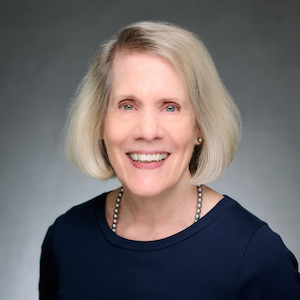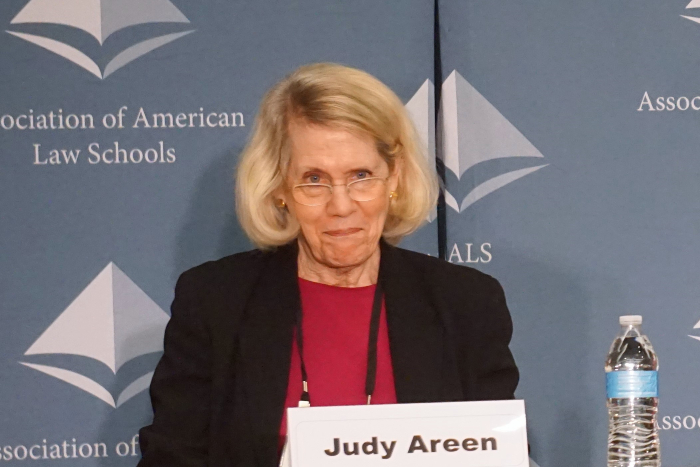- AALS News – Winter 2023
- Defending Democracy
- Report of the Executive Director to the AALS House of Representatives
- AALS President’s Report on 2022
- AALS Recordings Available On-Demand
- Stay up to Date with AALS Services
- Law Class of 2022 AALS Pro Bono Survey
- Highlights from the 2023 AALS Annual Meeting
- AALS Announces Sections of the Year
- Propose a Program for the 2024 Annual Meeting
- Nominations Sought for AALS President Elect, Executive Committee Positions
- Seeking Recommendations for AALS Committee Appointments
- Clinical Conference Returns In Person to San Francisco
- AALS Seeks Member Law School as Editorial Partner for the Journal of Legal Education
- Update Your Information in the AALS Directory of Law Teachers
By Judith Areen
 This past year began with the appearance of more COVID variants and some of the highest infection rates of the pandemic to date. Most law schools resumed in-person classes in the fall of 2021, but many were forced back to virtual classes for at least the first weeks in January 2022. All of us continue to wrestle with the challenge of living with COVID.
This past year began with the appearance of more COVID variants and some of the highest infection rates of the pandemic to date. Most law schools resumed in-person classes in the fall of 2021, but many were forced back to virtual classes for at least the first weeks in January 2022. All of us continue to wrestle with the challenge of living with COVID.
The spring of 2021 brought the beginning of a series of public hearings that reported on the investigation undertaken by a Select Committee of the House on the January 6 attack on the United States Capitol. The investigation culminated only last week in the first referral by a Congressional Committee of a former president for criminal prosecution.
Given the serious attacks on democracy that have arisen in the past few years and the role legal education plays in preparing lawyers to support the rule of law, it is particularly fitting that President Erwin Chemerinsky selected as the AALS theme for this meeting “How Law Schools Can Make a Difference.”
As a result of the hearings, we have learned a great deal about the critical role lawyers can play in defending democracy as shown by the work of our president and vice president, Liz Cheney and Jamie Raskin on the Committee, as well as former Attorney General William Barr and former White House Counsel Pat Cipollone. At the same time, a legal education clearly does not guarantee that all law school graduates are committed to democracy, given the actions of John Eastman, Rudy Giuliani, and Jeffrey Clark among others. We need to devote time and energy to better preparing our graduates for the challenges to democracy, voting rights, and the rule of law that still lie ahead.
1. The Year AALS Became a Hybrid Organization
The past year brought fresh challenges to AALS as well. I can best capture the spirit of our response by describing 2022 as the year AALS became a hybrid organization.
First, the staff continued to conduct most of its work remotely with no decrease in productivity. Beginning last spring, we asked everyone to spend at least one day a week in the office. Given the continuing high rate of COVID infections in DC, and the serious problems with Metro service, it was the right thing to do. Some staff prefer to spend more days in the office, and we developed a system for knowing who would be in the office on different days to minimize health challenges.
Second, for the first time AALS has hired some staff who work entirely remotely, including Darren Stadell, our Director of Technology, who resides in Alberta, Canada, and Alena Allen, our Deputy Director who continues to teach at the University of Arkansas, Fayetteville. These are not hires we would have made prior to the pandemic, but have learned how to integrate remote work and workers, and that we are able to recruit for some positions far beyond the DC, Maryland and Virginia area.
Finally, our work itself has become decidedly hybrid, and is likely to remain so. Last June AALS hosted the first AALS in-person event in three years. One hundred and twelve attended the 2022 Workshop for New Law School Teachers, considerably more than the 60 to 70 participants in the two years before the pandemic. The number of attendees indicated to us that faculty are interested in connecting in-person for some meetings.
AALS also offered a number of new and complimentary virtual meetings this past year for groups that have traditionally not attended our various meetings. In July we hosted a Workshop for Adjunct Faculty. In October AALS offered its first webinar for emeritus/retired faculty. More than 60 attendees gathered to hear a panel of constitutional law experts offer their insights into the current Supreme Court term.
This Annual Meeting is the first of four in-person meetings AALS will host in 2023 including the Clinical Conference in April in San Francisco, the 2023 New Law Teachers Workshop, and a new Advanced Deans Workshop for deans who are finishing their first year in office. They will both be held in June in Washington, DC. In 2023 AALS will also offer an even larger number of complimentary, virtual AALS programs including a webinar on Hiring Basics for Aspiring Law Professors in April, a Conference on Democracy in May, an Institutional Advancement Conference in June, a Conference on Affirmative Action and webinars for adjuncts and lecturers in July, and a webinar for appointment committees and one for candidates in August.

